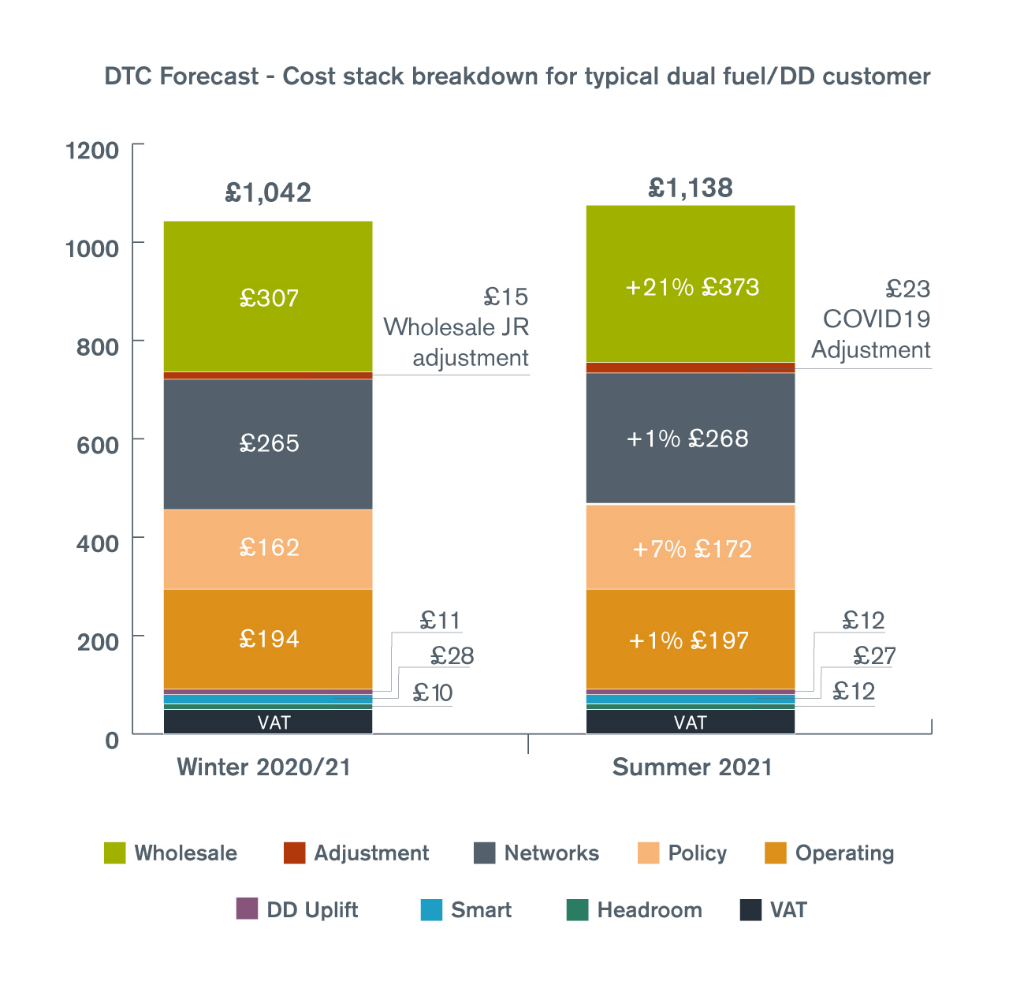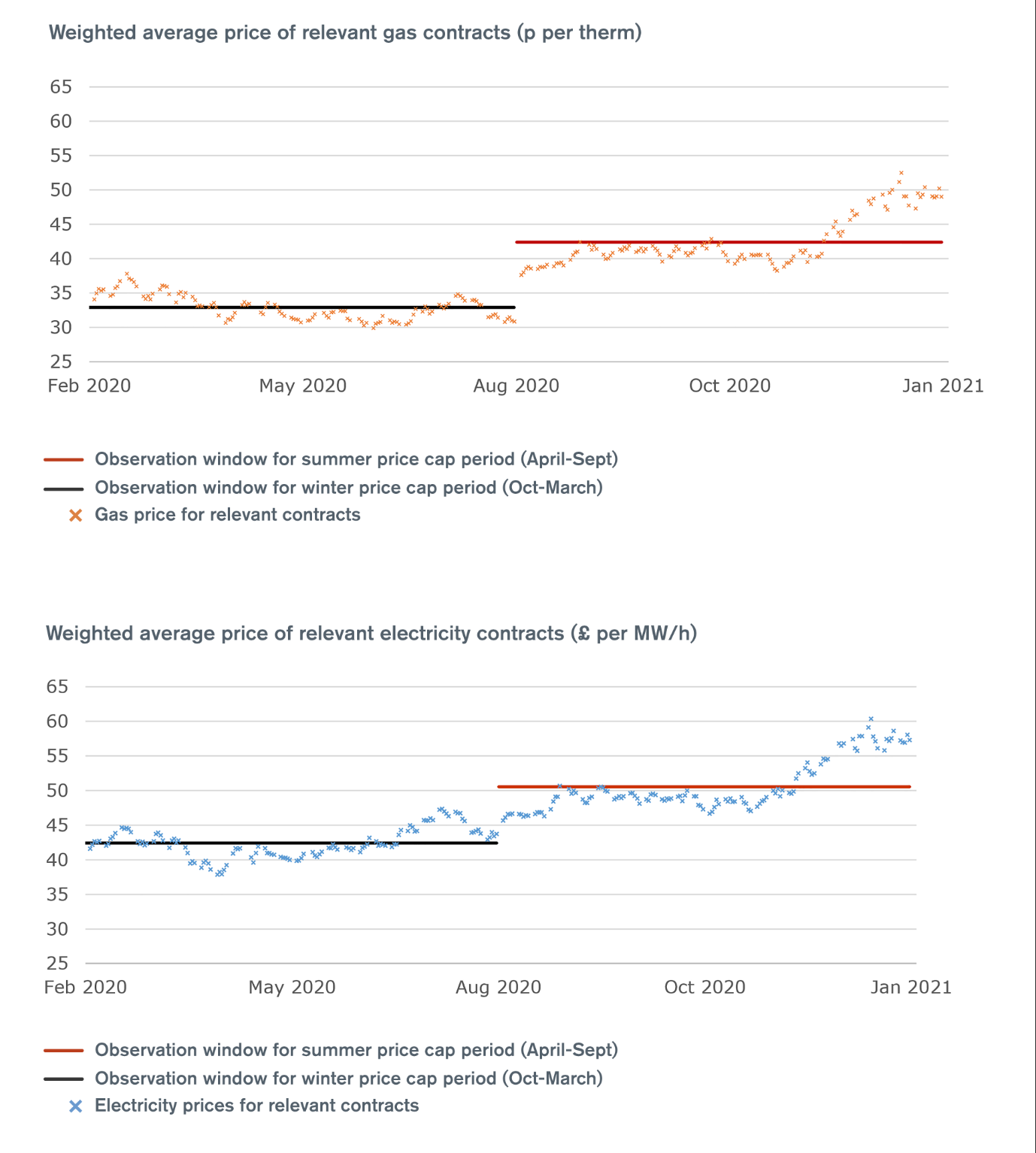Energy price cap to increase in April but consumers should switch to save money
-
Big increase in wholesale energy prices push up price cap by £96 to £1,138 to pre-pandemic levels
-
The price cap continues to save consumers up to £100 a year and they can save up to £150 more by switching tariff
-
Support is available for those struggling to pay their energy bills, especially those in vulnerable circumstances
Ofgem has announced today that from 1 April 2021 the price cap will return to pre-pandemic levels, principally as a result of changes in wholesale energy prices.
When wholesale prices fell sharply last year in the wake of the first lockdown, the level of the price cap fell by £84 in October to its lowest level yet for the current winter period.
Demand for energy has since recovered which has pushed wholesale prices back up to more normal levels.
For six months from 1 April the price cap will increase by £96 to £1,138 for 11 million default tariff customers, and by £87 to £1,156 for 4 million pre-payment meter customers.
The price cap protects consumers who have not switched energy supplier by ensuring they pay a fair price for their electricity and gas.
Ofgem adjusts the level of the cap up or down twice a year to reflect the costs of supplying electricity and gas for suppliers.
Households on default tariffs are saving an estimated £75-£100 a year or £1 billion in total on their energy bills as a result.
Consumers who want to avoid the increase and save money should shop around ahead of the increase in the price cap on 1 April.
Jonathan Brearley, chief executive of Ofgem, said:
“Energy bill increases are never welcome, especially as many households are struggling with the impact of the pandemic. We have carefully scrutinised these changes to ensure that customers only pay a fair price for their energy.
“The price cap offers a safety net against poor pricing practices, saving customers up to £100 a year, but if they want to avoid the increase in April they should shop around for a cheaper deal.
“As the UK still faces challenges around COVID-19, during this exceptional time I expect suppliers to set their prices competitively, treat all customers fairly and ensure that any household in financial distress is given access to the support they need.
“The government and Ofgem have been working with the energy industry and consumer groups to support customers through this difficult time and I urge anyone worried about paying their energy bills to contact their supplier and access the help available.”
For the default tariff price cap level starting on 1 April, Ofgem has also allowed suppliers to claim £23 to cover higher levels of bad debt from more customers being unable to pay their energy bills due to the impact of COVID-19.
This will ensure suppliers can continue to supply energy and protect their customers, especially those in vulnerable circumstances.
Suppliers are required to provide emergency credit to customers struggling to top up their pre-payment meters, put those who are behind on their bills on affordable repayment plans and should not disconnect their customers.
Many have gone further in providing support over the last year, for example helping pre-payment meter customers who are shielding to top up.
Notes to editors
1. Help available for consumers:
-
Ofgem rules require suppliers to offer emergency credit to pre-payment meter customers and put customers struggling to pay their energy bills on realistic and sustainable debt repayment plans based on their ability to pay.
-
If customers are struggling to pay for energy bills they should contact their energy supplier as soon as possible. Depending on their circumstances, customers may be eligible for extra help with their energy bills or services, such as payment breaks, suspending credit meter disconnections, and schemes like the Winter Fuel Payment or Warm Home Discount rebate.
-
The Citizens Advice consumer service can provide advice on how customers can resolve problems with their energy provider. For complex or urgent cases, or if a person is in a vulnerable situation they may then be referred onto the Extra Help Unit.
-
For help on how to switch to a better deal, see Ofgem’s guide.
2. The price cap is a cap on a unit of gas and electricity, with standing charges taken into account. It is not a cap on customers’ overall energy bills, which will still rise or fall in line with their energy consumption.
Breakdown of cap

Note: Cost breakdowns above do not add up exactly to total cap levels due to rounding effect.
3. The £1,138 per year level of the cap is based on a household with typical consumption on a dual electricity and gas bill paying by direct debit. Customers who pay by standard credit (cash or cheque) pay an additional £85 based on the higher cost for suppliers to serve them. The additional allowance for COVID-19 bad debt (see below) does not apply to the pre-payment meter level of the cap, which explains the wider difference for the next price cap period. The values shown in the text above include VAT, and are expressed for the current Typical Domestic Consumption Values (TDCV) of 2,900kWh of electricity, 12,000kWh of gas, and 4,200kWh of electricity for Economy 7.
4. Wholesale adjustment: Following a judicial review (JR), a judge ordered Ofgem to reconsider how we calculated wholesale energy costs for the first cap period when the default cap was introduced. We made a one-off £15 temporary wholesale adjustment for the current price cap period so suppliers can recover these costs. This adjustment will be removed for the next price cap period starting on 1 April. It does not apply to the prepayment level of the cap.
5. COVID-19 bad debt: The default tariff price cap from 1 April includes an additional allowance to allow suppliers to start to recover some of their additional costs related to COVID-19, such as higher levels of bad debt from more customers being unable to pay their energy bills. This is based on a highly conservative assessment. In order to minimise the impact on consumers of higher bills, suppliers will have to recover some of the costs in a phased approach between April 2021 and March 2022. On Tuesday Ofgem published the additional allowance with benchmark consumption calculations as £23.69. Using new TDCV values the allowance is £23.14.
6. From 1 April the equivalent per unit level of the price cap to the nearest pence for a typical customer paying by direct debit will be 19p per kWh for electricity customers and 3p per kWh for gas customers.
7. Suppliers buy electricity and gas on the wholesale markets in advance, purchasing ‘forward contracts’ gradually over time. The default tariff price reflects suppliers’ costs because we use the wholesale prices of the relevant forward contracts that were sold in advance during an ‘observation window’ before each six-month price cap period. The observation window for the summer price cap period (April - September) is the previous August - January. The observation window for the winter price cap period (October – March) is the previous February - July. The graphs below show a) how wholesale gas and electricity prices for the relevant contracts on offer in each observation window result in an allowance that reflects suppliers’ average costs:

Data sets behind this graph are proprietary, and can be sourced from ICIS.
8. Ofgem analysis at the time the default tariff cap was introduced on 1 January 2019 suggests that the default tariff price cap would have reduced the price of the average standard variable tariffs from the six largest suppliers by around £75 to £100 per year since April 2015 had it been in place over this period. The research shows suppliers have consistently charged more than the indicative level of the default tariff cap, which reflects the estimated costs of an efficient supplier. This analysis suggests had the cap not been introduced on 1 January 2019, customers would be paying significantly more. However, it is impossible to estimate an exact savings figure going forward as suppliers can no longer price above the level of the cap. Information and materials for consumers about the price caps is available at: www.ofgem.gov.uk/energy-price-caps.
For media, contact
Michelle Amos: 020 7901 1881
Media out of hours mobile: 0792 882 9894 (media calls only)
General enquiries (non-media)
If you are an energy customer looking for help and advice, including complaints about energy firms, please see our Household gas and electricity guide. Citizens Advice also provide a free, impartial helpline service across a range of issues on 0808 223 1133.
We also regularly share news and post general advice to help consumers get the most out of their energy services via our @Ofgem twitter and Facebook pages. If you have an enquiry or complaint relating to Ofgem’s policies or functions, contact us at consumeraffairs@ofgem.gov.uk or on 020 7901 7295.
For all other non-media related enquiries, please visit our Contact us page.
About Ofgem
Ofgem is Britain’s independent energy regulator. Our role is to protect consumers now and in the future by working to deliver a greener, fairer energy system. We do this by:
-
Working with Government, industry and consumer groups to deliver a net zero economy at the lowest cost to consumers.
-
Stamping out sharp and bad practice, ensuring fair treatment for all consumers, especially the vulnerable.
-
Enabling competition and innovation, which drives down prices and results in new products and services for consumers.
For facts, figures and information about Ofgem’s work, see Energy facts and figures or visit the Ofgem Data Portal.
For energy insights and updates straight to your inbox from Ofgem, please subscribe.